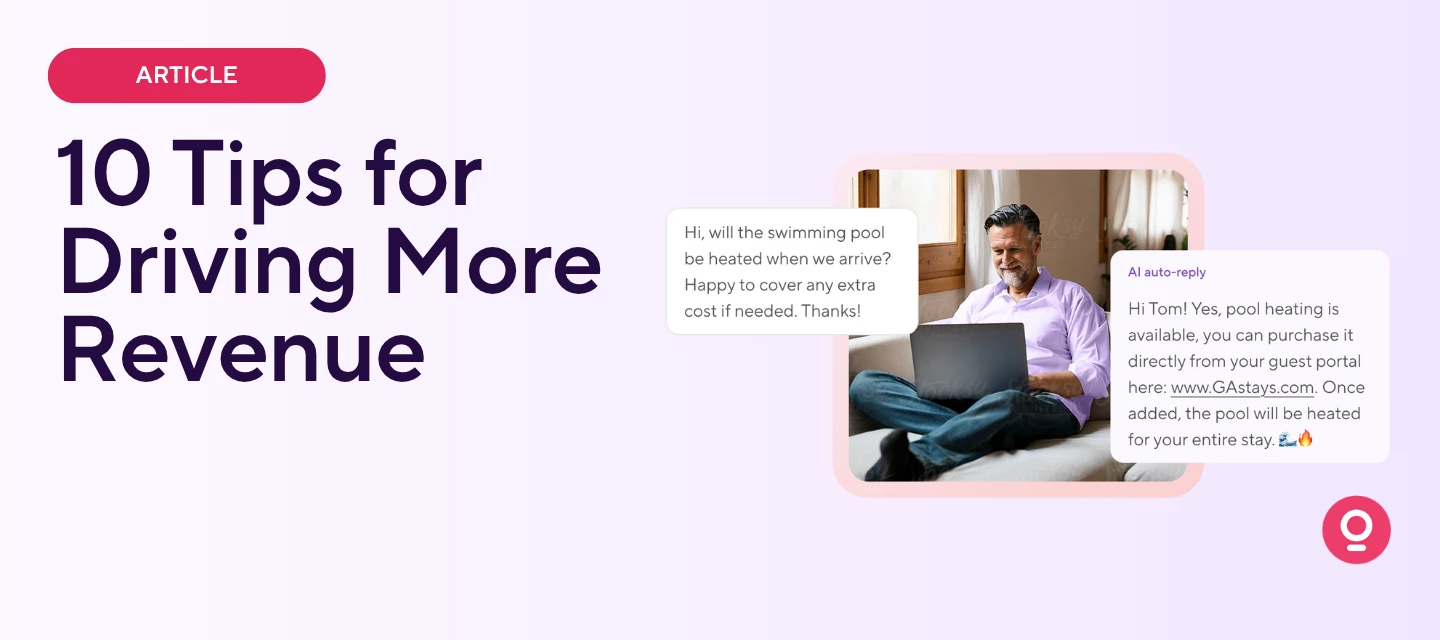At the VRMA International Conference 2025, Derek Jones (
Derek drew on a unique mix of perspectives: leading the onboarding, sales, and customer success teams for Hospitable and managing 22 short-term rental listings personally as a host with a decade of experience.
What he shared was not a product pitch, but a set of hard-earned lessons about what works, what does not, and how even small changes can create meaningful results in occupancy, guest satisfaction, and revenue.
1. Respond faster with AI-powered messaging
Guest communication is where trust is won or lost. Research shows that four out of five guests are willing to forgive even noticeable issues if they receive a quick, thoughtful reply. A bathroom mishap or a cleanliness complaint may not sink your review if you respond within 5 to 15 minutes.
Hospitable and other providers now offer AI tools that automatically read guest messages, flag guest issues, and suggest responses. This ensures urgent issues are not buried and that routine questions can be answered in seconds. The payoff is immediate: faster responses lead to happier guests and higher booking conversion.
2. Treat upsells as an untapped opportunity
Accommodation costs make up only 30 to 40 percent of what guests spend during their trip. The rest goes toward experiences, food, and extras. Why not capture some of that spend?
Derek shared the example of a simple “Movie Night” package with Coca-Cola, kettle corn, Skittles, and M&Ms, all bought in bulk for a few dollars. Cleaners restock and set it out, and about 15 percent of guests purchase it. Event decorations for weddings, showers, or parties can be another high-margin option. In his business, upsells generated six percent of annual revenue. That revenue is nearly all profit and improves guest satisfaction at the same time.
3. Polish your host profile
Most hosts set up their profile once and forget it. Yet the host profile is often the first thing guests check after looking at reviews. A complete, personal profile builds trust and creates connection.
Add a professional headshot, fill in every field, and include fun personal facts that spark conversation. Even lighthearted details like “I am an identical twin” or “I cannot resist a box of Girl Scout cookies” can become icebreakers. Guests feel like they are booking from a real person, not a faceless business, and that feeling often leads to better reviews and repeat bookings.
4. Make reviews part of your system
Reviews are the currency of credibility. One poor review can have outsized effects, but consistent five-star reviews build momentum. The key is to have a process for how you ask.
Derek explained that his strategy is to ask three times within 24 hours of checkout, with the first message sent three hours after checkout. This timing lines up with Airbnb’s own review reminders and catches guests before they move on with their lives. The ask should be thoughtful and framed as supporting a “local business.” Always respond to reviews as well. Even a short acknowledgment shows guests that their feedback matters and signals professionalism to future bookers.
5. Turn early check-in and late check-out into real revenue
Some hosts prefer to offer these perks free of charge, while others monetize them. But the opportunity goes beyond a few hours. If your calendar allows, offer a full extra day at a discounted rate. Guests appreciate the option to extend a trip, and you gain revenue you may not have captured otherwise.
For Derek, early check-in and late check-out upsells contributed about three percent of annual revenue. Combined with other upsells, that reached nine percent. Over time, those percentages add up to a significant amount.
6. Collect guest emails thoughtfully
Repeat guests are one of the most valuable growth channels, but you need a way to reach them. Collecting email addresses can be done while still respecting platform rules if it is framed as a compliance requirement, for example, through a local property agreement.
By explaining clearly that communication will stay on-platform, but that an email address is required for compliance and receipts, Derek has collected unique emails for more than 80 percent of bookings. These contacts provide a foundation for long-term relationships and repeat business.
7. Encourage guests to share before they leave
Guests love to capture and share memories. By creating small prompts to “book before you leave” moments, you can turn their excitement into organic marketing. One operator used acrylic stands with QR codes that link to a Google review and to social media tags for the property. Guests were invited to post about their trip and tag the rental in exchange for a $20 gift card.
The result: genuine social media content, new visibility to the guest’s network, and a review to strengthen the property’s reputation. It is an inexpensive way to turn every guest into a potential ambassador.
8. Capture group travel opportunities
Large group travel creates ripple effects in demand. By enabling a pre-booking message requirement on Airbnb, hosts can learn why a guest is booking, such as a wedding, sports tournament, or recital.
That information opens the door to upselling additional reservations. Derek recommends sending a simple follow-up, such as “Does anyone else in your group need accommodations?” which can lead to multiple bookings from one lead. Offering a credit or small incentive makes it even more likely that the first guest will share your listings with their group.
9. Use smart thermostats to save money and protect the guest experience
Energy bills for single-family rentals can easily reach several hundred dollars per month. Without monitoring, thermostats are often left running long before or after a stay. Smart thermostat integrations solve this by turning systems on shortly before check-in and off after checkout, while still circulating air to prevent humidity issues.
Derek shared that this approach not only saves costs and avoids complaints, but also provides peace of mind. It also allows property managers to justify a technology fee to owners by showing tangible value.
10. Apply AI to strengthen your listing
Your reviews contain a goldmine of insights about what guests value most. AI can analyze reviews, identify common compliments, and highlight what is missing from your description. From there, it can suggest headlines, rewrite sections for clarity, and ensure your listing is easy to skim.
Think about the “Starbucks test.” If a guest can read your listing description in line at a coffee shop, you are on the right track. Short sections, bulleted amenities, and key highlights at the top will outperform dense paragraphs every time.
Small actions, big results
The core message of Derek’s session at VRMA 2025 was not to overhaul your business overnight. It was to make small, immediate changes. Adjust your review request timing, add a low-cost upsell, or refresh your host profile today. Each improvement builds momentum and contributes to a healthier bottom line.
As Derek put it: “If you leave here and do not make at least one change today, this session was a waste of time.”





